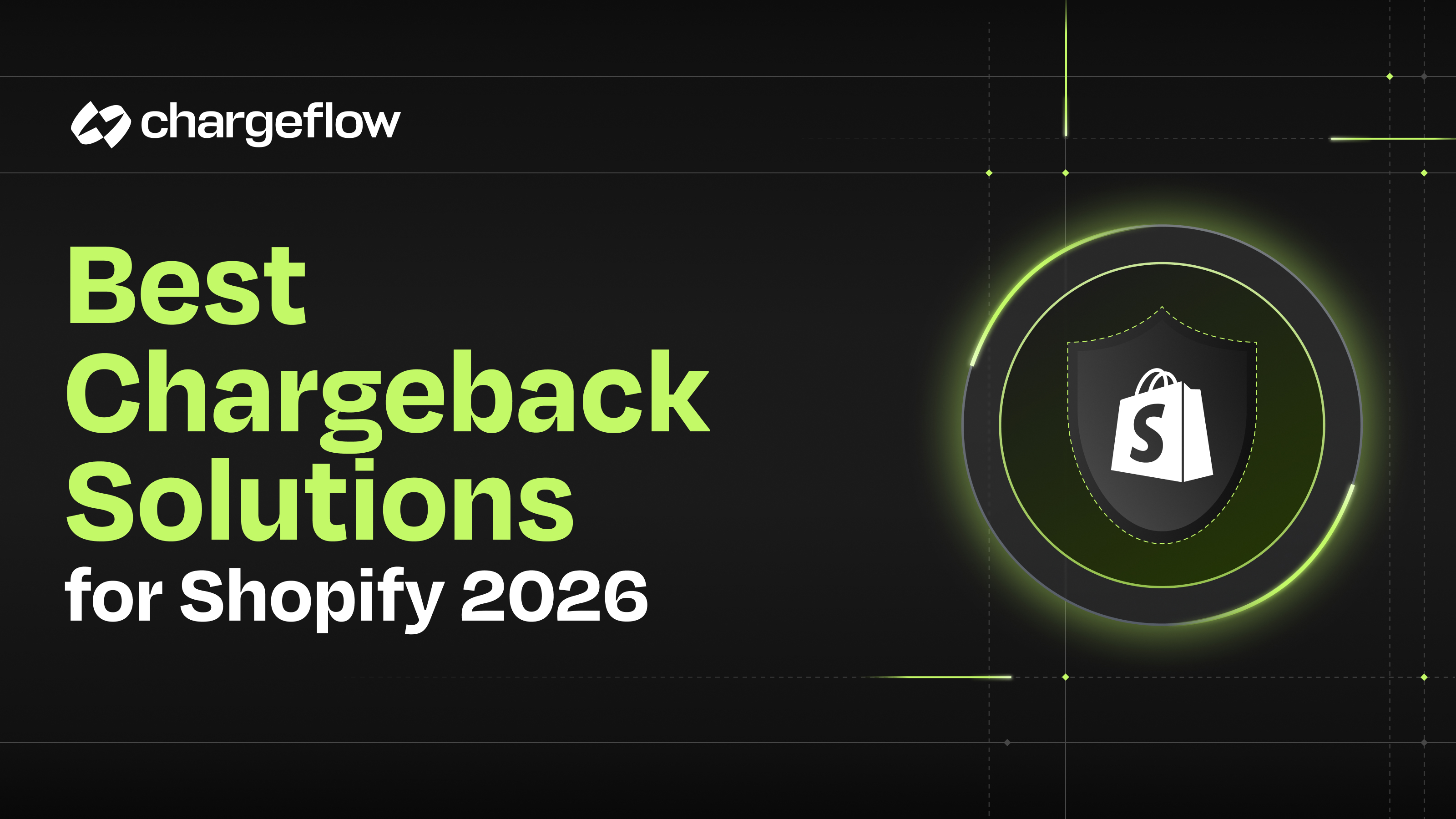Understanding Chargeback Fees and Costs: A Merchant’s Guide

Chargebacks?
No longer your problem.
Recover 4x more chargebacks and prevent up to 90% of incoming ones, powered by AI and a global network of 15,000 merchants.
Chargeback fees are non-negotiable fees you pay when cardholders dispute a charge. They range between $15-$100. You don’t have to keep eating those fees as the cost of sales. They’re not. Yet, you can minimize losses and maintain strong customer relationships by understanding chargeback fees, mastering the dispute resolution process, and implementing prevention strategies.Use the insights in this guide to improve your odds. Act quickly to meet dispute deadlines, use fraud detection tools to track chargebacks, and monitor fees and ratios to avoid long-term vulnerabilities.
As an eCommerce merchant, chargebacks are part of the business – lost revenue, additional fees, and sometimes even strained relationships. Understanding these costs can help you to manage and reduce them effectively.
In our recent post, we delved into the broader impact of chargebacks, from operational to indirect costs. Here, we focus on chargeback fees: what they are, why they’re applied, and how to proactively manage them to protect your profit margins. With this strategic approach, you’ll be able to navigate these costs more effectively and reduce your chargeback risk over time.
What Are Chargeback Fees?
Chargeback fees are costs merchants incur when a customer disputes a transaction and the bank reverses the charge. These non-negotiable fees are imposed by payment processors or merchant acquirers to offset their administrative work of mediating disputes. For merchants, chargeback fees are not just another cost—they’re often unexpected expenses that directly impact profitability.
Unlike refunds, chargebacks involve third parties (banks, card networks, processors). Each party plays a key role in the process, making dispute mediation difficult and costly. Chargeback fees typically range from $15 to $100 per case, depending on the processor and vertical. High-risk merchants, like those in electronics or luxury, often incur steeper charges.
Let's examine what chargeback fees entail, why they hurt, and how to bypass them without breaking payment rules.
Why Are Chargebacks So Costly?
A chargeback isn’t just a simple transaction reversal; it's a costly setback that can significantly affect a merchant’s business. Here’s why chargeback fees are so expensive for merchants:
- Lost Revenue: You refund the transaction amount, even if the product was delivered. Scammers use chargeback fraud to steal from merchants, retaining the product and the transaction amount.
- Chargeback Fees: The $15 to $100 chargeback fees eat into your margins. According to Mastercard, an average dispute costs merchants at least $74.
- Operational Cost: Time and resources dedicated to gathering evidence and responding to disputes divert resources from growth prospects.
- Strained Customer Relationship: Dispute, false and legitimate, often erodes consumer trust. This makes repeat business impossible.
- Long-Term Damages: Brands with excessive chargebacks enter fraud monitoring programs, incur high processing fees, and even face account termination by card processors.
Put this in better perspective, a $70 chargeback with a $25 fee and two 1.5 hours of staff time (at $20/hour) could cost you $125. This is far more than the original transaction amount. Now do the math for multiple cases, and you’ll see why chargeback costs sting!
How Are Chargeback Fees Calculated?
Chargeback fees depend on several factors such as the card network, payment processor, and the merchant’s chargeback history. Generally, these fees cover the costs in the chargeback process flow, from processing and investigating disputes to resolving them.
Let’s unravel what goes into chargeback fee calculation:
- Card Network: Visa, Mastercard, and Amex have distinct fee structures. For example, Visa’s chargeback fees often start at $20, while over at Amex, you can pay up to $50.
- Payment Processor: Card processors like Stripe, PayPal, or Adyen establish their own fees, often in the neighborhood of $15 to $35 for standard accounts. Stripe recently changed fee structures, introducing a new $15 dispute counter fee added on top of the existing dispute fee.
- Merchant’s Dispute History: eCommerce vendors with excessive disputes carry higher chargeback fees, as high chargeback ratios mean penalties and excessive per-dispute charges.
- Merchant’s Vertical: Industries prone to disputes (e.g., travel and tourism, CBD) traditionally incur higher fees, which can be more than $100 per dispute.
Understanding what you pay for chargebacks incurred helps you choose a cost-effective payment processor. So regularly review your processor statements to spot hidden fees and negotiate better terms based on your chargeback performance.
Understanding Chargeback Rules and Time Limits
Each card brand enforces stringent rules and deadlines, time limits, for chargeback processing. This can vary by reason code (e.g., transaction unauthorized, order not as described) and the acquiring bank. Merchants generally have 20-45 days to respond to a dispute notification, depending on the card network involved:
- Visa: 20 days
- Mastercard: 45 days
- Amex: 20 days
Your acquiring bank or payment processor might impose earlier internal deadlines to meet card network requirements. Also, the official dispute "day one" may not align with when you receive the notification due to processing delays between the card network, acquirer, and your system.
Missing chargeback response deadlines means loss by default, which translates to all the costs associated with the case, as discussed earlier.
To ensure you don’t run out of time:
- Set up chargeback alerts: Use Chargeflow Alert to stop 90% of impending chargebacks from happening.
- Understand reason codes: Study the chargeback reason code and familiarize yourself with the various numerics from the various card networks.
- Respond immediately: Automate your chargebacks to streamline responses so you don’t use all your time for evidence gathering and rebuttal writing.
Chargeback Process Flow: From Dispute to Resolution
The chargeback process has multiple stages, requiring clear documentation and quick responses to improve resolution outcomes. Here’s a step-by-step breakdown to ensure a successful outcome:
- Dispute Initiation
Cardholder disputes a transaction due to fraud, unrecognized charges, or dissatisfaction. The issuing bank temporarily reverses the payment, initiating the chargeback. - Issuing Bank Review and Chargeback
The bank investigates the claim. If the bank determines the claim is reasonable, they'll award a conditional refund to the buyer and notify the payment processor, who then alerts you, the merchant. - Merchant Notification
The merchant receives a chargeback notice with a chargeback reason code (e.g., "Not as Described" or "Fraud") and the disputed amount. This notice includes a deadline for the merchant to respond. - Evidence Collection by Merchant
The merchant gathers the necessary documentation within the response time frame. Documentation such as proof of delivery, transaction records, signed receipts, and customer communications may be required. - Merchant Response (Representment)
If the merchant believes the chargeback is unreasonable, they may submit a reply (representment) to the acquiring bank with evidence consistent with the reason code. In the case of fraud, this may include customer authentication (such as a CVV or AVS check). - Acquirer and Issuer Analysis (Bank Analysis)
The merchant evidence is reviewed by the bank and, if sufficient, is forwarded to the issuing bank for final review. Both banks assess the sufficiency of the evidence and ultimately decide whether to support or reverse the chargeback. - Resolution and Final Decision
The issuing bank makes the final decision based on the evidence. If the evidence is decided in favor of the merchant, the chargeback is honored. If the cardholder wins, the merchant releases the transaction amount and incurs ancillary charges as highlighted above.

How to Reverse a Credit Card Chargeback
Winning a chargeback dispute is an uphill battle that requires strong evidence submission and following stringent protocols. Here’s how to reverse a chargeback and reclaim your stolen money:
1. Submit Clear Documentation
Tailor your documentation to the reason code. For instance:
- Fraud: Submit AVS/CVV checks or 3D Secure authentication.
- Order Not Delivered: Include order tracking information and delivery confirmation.
- Item Not As Described: Add product descriptions, merchandise photos, and return policy.
2. Await Issuing Bank Confirmation
If your evidence is compelling, the issuing bank will side with you and notify the processor. The documentation review process generally takes 30 to 60 days.
3. Verify Credit Reversal
Check your account for the reversal funds, typically credited within 3-7 business days.
4. Update Records and Track Fees
Document the reversal in your financials for accurate reporting. Some processors do not refund chargeback fees even for won disputes, so review your statement for accurate chargeback accounting.
With all this said, you should also know that a recent Mastercard research found that merchants win only a minuscule 8.1% of disputes they represent. So, manual chargeback reversal is predominantly ineffective. Yet, automated chargeback management yields an average 75% win rate.
Case Study: Aptlife Media Slashed Its Chargeback Ratio by 82% and Saved 145 Hours by Preventing Hundreds of Chargebacks on Autopilot.
Aptlife Media, a U.S.-based company offering high-risk services like psychic readings and astrology consultations, faced persistent challenges with chargebacks. These disputes threatened their revenue and strained their relationships with payment processors like Stripe. Manual efforts to manage and prevent these disputes were time-consuming and ineffective, leaving Aptlife vulnerable.
Aptlife turned to Chargeflow, a platform that uses AI-driven automation and real-time monitoring, to transform its approach. The impact was immediate and impressive:
- 82% chargeback reduction: Dropping from 1.1% to only 0.2%, Aptlife strengthened its compliance and protected its bottom line.
- 145 hours saved: Automation eliminated hundreds of hours of manual work, freeing the team to focus on growing the business.
- Hundreds of chargebacks prevented: Proactive prevention stopped disputes in their tracks, boosting revenue recovery and processor trust.
This remarkable success story shows how chargeback automation is turning the chargeback challenge into an opportunity, especially for businesses in high-risk industries.
Read the full case study here.

Mastering the Chargeback Process to Protect Your Profits
Chargebacks don’t have to derail your eCommerce business. You don’t have to keep eating those fees as the cost of sales. They’re not. Yet, you can minimize losses and maintain strong customer relationships by understanding chargeback fees, mastering the dispute resolution process, and implementing prevention strategies.
Use the insights in this guide to improve your odds. Act quickly to meet dispute deadlines, use fraud detection tools to track chargebacks, and monitor fees and ratios to avoid long-term vulnerabilities. Are you ready to take charge of your chargeback process? Partner with Chargeflow today! Here’s how to get started.

Chargebacks?
No longer your problem.
Recover 4x more chargebacks and prevent up to 90% of incoming ones, powered by AI and a global network of 15,000 merchants.






























.png)








